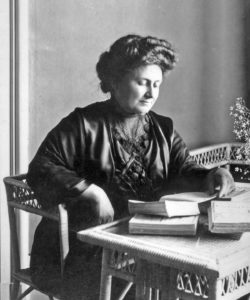The Montessori Philosophy
 Montessori is a philosophy with the fundamental tenet that a child learns best within a social environment which supports each individual’s unique development.
Montessori is a philosophy with the fundamental tenet that a child learns best within a social environment which supports each individual’s unique development.
Dr. Maria Montessori, the creator of what is called “The Montessori Method of Education,” based this new education on her scientific observations of young children’s behavior. As the first woman physician to graduate from the University of Rome, Montessori became involved with education as a doctor treating children labeled as retarded. Then in 1907 she was invited to open a child care center for the children of desperately poor families in the San Lorenzo slums of Rome.
She called it a “A Children’s House,” and based the program on her observations that young children learn best in a homelike setting, filled with developmentally appropriate materials that provide experiences contributing to the growth of self-motivated, independent learners.
Montessori’s dynamic theories included such revolutionary premises as:
- Children are to be respected as different from adults and as individuals who are different from one another.
- Children create themselves through purposeful activity.
- The most important years for learning are from birth to age six.
- Children possess unusual sensitivity and mental powers for absorbing and learning from their environment, which includes people as well as materials.
She carried her message throughout the world, including the United States as early as 1912. After an enthusiastic first response, interest in the U.S. waned until a reintroduction of the method in the mid-1950’s, followed by the organization of the American Montessori Society in 1960.
The “whole child” approach. The primary goal of a Montessori program is to help each child reach full potential in all areas of life. Activities promote the development of social skills, emotional growth, and physical coordination as well as cognitive preparation. The holistic curriculum, under the direction of a specially prepared teacher, allows the child to experience the joy of learning, time to enjoy the process and insure the development of self-esteem, and provides the experiences from which children create their knowledge.
The “Prepared Environment.” In order for self-directed learning to take place, the whole learning environment room, materials and social climate-must be supportive of the learner. The teacher provides necessary resources, including opportunities for children to function in a safe and positive climate. The teacher thus gains the children’s trust, which enables them to try new things and build self-confidence.
The Montessori materials. Dr. Montessori’s observations of the kinds of things which children enjoy and go back to repeatedly led her to design a number of multi-sensory, sequential and self-correcting materials which facilitate the learning of skills and lead to learning of abstract ideas.
The teacher. Originally called a “Directress,” the Montessori teacher functions as designer of the environment, resource person, role model, demonstrator, record-keeper and meticulous observer of each child’s behavior and growth.
The teacher acts as a facilitator of learning. Extensive training-a minimum of a full year following the baccalaureate degree is required for a full AMS credential, including a year’s student teaching under supervision-is specialized for the age group with which a teacher will work, i.e., infant and toddler, three to six year olds, elementary or secondary level.
Each Montessori class, from toddlers through high school, operates on the principle of freedom within limits. Every program has its set of ground rules which differs from age to age, but is always based on core Montessori beliefs: respect for each other and for the environment.
Children are free to work at their own pace with materials they have chosen, either alone or with others. The teacher relies on his or her observations of the children to determine which new activities and materials he may introduce to an individual child or to a small or large group. The aim is to encourage active, self-directed learning and to strike a balance of individual mastery with small group collaboration within the whole group community.
The three-year-age span in each class provides a family-like grouping where learning can take place naturally. More experienced children share what they have learned while reinforcing their own learning. Because this peer group learning is intrinsic to Montessori, there are often more conversation-language experiences-in the Montessori classroom than in conventional early education settings.
Creativity flourishes in an atmosphere of acceptance and trust. Montessorians recognize that each child, from toddler to teenager, learns and expresses himself in a very individual way.
Music, art, storytelling, movement and drama are part of every American Montessori program. But there are other things particular to the Montessori environment which encourages creative development: many materials which stimulate interest and involvement; an emphasis on the sensory aspect of experience; and the opportunity for both verbal and nonverbal modes of learning.
Montessori children are unusually adaptable. They have learned to work independently and in groups. Since they’ve been encouraged to make decisions from an early age, these children are problem-solvers who can make choices and manage their time well.
They have also been encouraged to exchange ideas and to discuss their work freely with others and good communication skills ease the way in new settings.
Research has shown that the best predictor of future success is a sense of self-esteem. Montessori programs, based on self-directed, non-competitive activities, help children develop good self-images and the confidence to face challenges and change with optimism.
